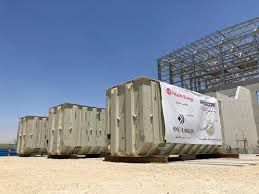Egypt is becoming a major electricity exporter, with plans to expand its reach into the Asian market. The country has already established itself as a key player in electricity distribution, supplying power to neighboring countries like Sudan, Libya, Lebanon, and Jordan. Last year, Egypt earned $1.3 billion from electricity exports.

The recent installation of a transformer in Badr, Egypt, is part of the Egypt-Saudi Arabia electrical interconnection project, which aims to link Egypt to Saudi Arabia and other Asian and European countries.
This $1.8 billion initiative involves the construction of three high-voltage substations (two in Saudi Arabia, one in Egypt) connected by 1,350 km of overhead lines and 22 km of undersea cables across the Gulf of Aqaba.
Once fully operational by 2026, the project will allow Egypt to supply 3,000 megawatts (MW) directly to Saudi Arabia. Beyond bolstering domestic supply, this project opens doors for future electricity exports to Asia and Europe, potentially expanding interconnection opportunities with neighboring countries.
Egypt is well-positioned to become a key electricity distributor in the region. As one of Africa’s largest electricity producers, with a production capacity of 209,677 gigawatts, Egypt only expends a small amount of that energy. With recent energy crises causing power outages during high-demand periods in Asia, Egypt sees an opportunity to sell its surplus electricity to the Asian market.
Although Egypt already supplies electricity indirectly to Asia through resale, such as when Jordan agreed to sell 40 megawatts of its imported electricity to Iraq in February, the country is now entering the Asian market through a central hub that connects other Asian countries.
The Egypt-Saudi Arabia electrical interconnection project is expected to be a game-changer in the region’s energy landscape. By leveraging the differing peak load timings of the two networks, the project aims to maximize generation capacities in both countries while reducing fuel consumption.
It represents a significant step toward a regional interconnected grid, promoting greater electricity supply stability and reliability between Egypt and Saudi Arabia, with potential economic and developmental benefits.
As Egypt continues to expand its electricity export capabilities, it is poised to play a crucial role in addressing energy challenges across the region. With its strategic location and abundant electricity production, Egypt is well-equipped to become a major player in the global energy market.



